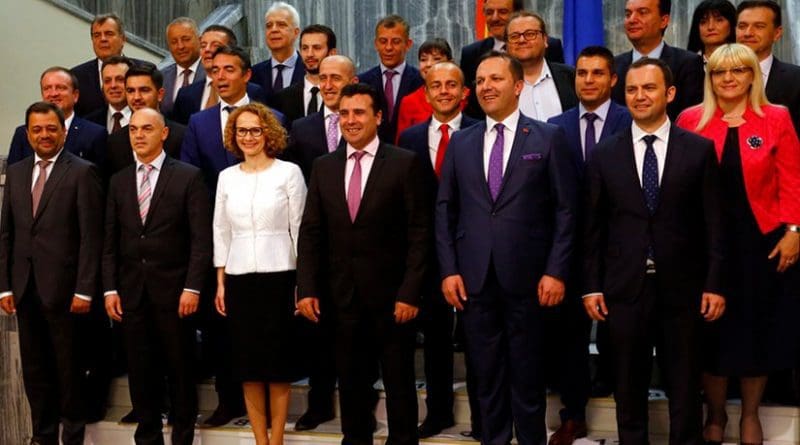Macedonia: Parliament Approves New Government After Prolonged Stalemate
By Sinisa Jakov Marusic
Macedonia’s new government was elected Wednesday night with the support of 62 MPs in the 120-seat parliament. Its establishment is expected to put an end to the prolonged political crisis in the country. The previous government, led by the right-wing VMRO-DPMNE party stood accused of allegations of wiretapping and corruption.
“I will be a prime minister [working] for everyone. I announce a responsible, reformist, European government!” the new prime minister, Zaev, said in his announcement to MPs.
Zaev said his government would be based on civic principles and focus on three key goals: Boosting the economy, enabling justice and the rule of law, and integrating the country into the EU and NATO. He also pledged to have zero tolerance for corruption.
Among other things, the new prime minister announced the formation of a special court wing that would solely focus on processing high-level corruption cases instigated by the Special Prosecution, and thorough reforms in the judiciary in order to remove party influence.
“I want no revenge and revanchism, but everyone will be held responsible acourding to their deeds”, Zaev said.
The bulk of the new cabinet comprises 17 ministers proposed by the alliance led by the Social Democrats, SDSM. The largest Albanian party, the Democratic Union for Integration, DUI, which controls ten seats, has appointed six and the Alliance for Albanians, which has three MPs, has appointed two.
Besa [Oath], the second-largest ethnic Albanian party, decided not to join the new government and not to vote for it despite initially supporting the new majority. However, Besa said it may support some of its policies.
VMRO-DPMNE has been in power since 2006 and over the past two-and-a-half years has been entangled in several corruption allegations. The party has accused the new government of striving to nullify previous positive achievements and reforms and for threatening to politically persecute the VMRO-DPMNE leadership.
“We carried out many reforms… It is simply funny when someone now acts as if everything starts with them and as they invented reforms”, said VMRO-DPMNE leader Nikola Gruevski.
VMRO-DPMNE insisted that they were the true winners during the December 11 elections, by winning the most votes from the ethnic Macedonian population, and that their victory was stolen by “post-electoral engineering” which saw their former Albanian allies, the DUI, shifting sides and supporting Zaev.
Macedonia had been without a new government since the early general elections on December 11 failed to resolve the political crisis.
The polls ended in near-tie results between SDSM, which won 49 MPs, and VMRO-DPMNE, which won 51, after which VMRO-DPMNE was not able to renew its government alliance. It then blocked a peaceful transfer of power.
Zaev finally obtained the presidential mandate to form the new government on May 17. This happened after a dramatic violent episode in parliament on April 27. The United States and the EU also exerted pressure on VMRO-DPMNE and on Macedonian President Gjorge Ivanov to remove any blockades.
If it hopes to live up to its promises, the new government faces the daunting task of rebuilding institutions, financial consolidation and curbing corruption, observers say.

